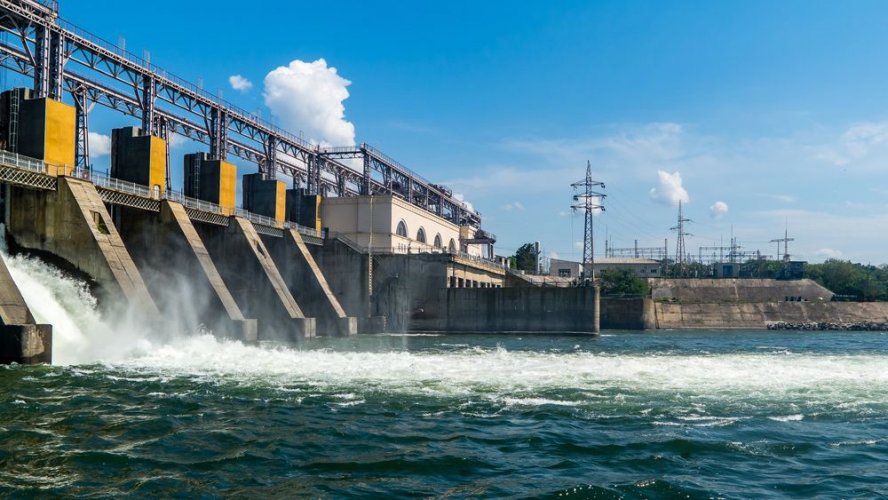The Ministry of Environmental Protection and Natural Resources of Ukraine, in the final version of the "Concept Note Defining the Scope of Deviations from Environmental Impact Assessment Rules," did not take into account the public's comments and canceled the Environmental Impact Assessment (EIA) for the construction project of the Kakhovskaya HPP and the military memorial cemetery.
Eco-activists of the Ukrainian Nature Protection Group (UPG) drew attention to this.
They noted that officials of the Ministry of Environment did not correct the document in any way, taking into account the comments of public representatives, voiced during the meetings and sent to the ministry by mail.
The memo contains a list of construction projects for military and defense facilities, energy facilities, restoration of individual buildings that were destroyed during Russian shelling, and ammunition production. The UPG agreed with most of the points, but they consider the inclusion in the list of the Kakhovskaya HPP restoration project and activities related to the placement of the National Military Memorial Cemetery on the territory of the Emerald Network "obviously lobbying."
"The argumentation on most of the pages of the note creates the impression that it was developed only for these two points," – say the activists.
They named 6 circumstances, which, in their opinion, the Ministry of Environment omits without considering, canceling the OVD for the restoration project of the Kakhovskaya HPP:
1. The territory of the former reservoir is currently overgrown with a young self-seeding forest, which the state is obliged to protect by law. According to optimistic forecasts, its area will be more than 890 square meters. km
2. Also, several nature reserves and 2 national parks are located on this territory, which are now actively overgrown with young forests.
"So the ministry proposes not to conduct an assessment of the flooding of protected forests?" – asked the UPG.
3. Large-scale discharges of water during certain peak hours of operation of the Kakhovskaya HPP will negatively affect the Nizhnyodniprovskyi National Park and 40 other territories of the nature reserve fund, which are located downstream from the dam of the Kakhovskaya HPP.
"Everything living on the territory of the largest national park in the south of Ukraine will be flooded and washed away by streams of water twice a day," activists predict.
4. UPG rejects the need to build hydroelectric power stations for irrigation. The members of the group explain this position for two reasons: firstly, the previously irrigated land is currently a zone of active hostilities; secondly, this is the salinization of irrigated soils, which will make it impossible to use them in 15-20 years.
5. Activists are sure that from the point of view of energy, it is better not to rebuild the hydroelectric power plant, but to replace it with decentralized solar power plants. According to activists' calculations, 100 times less area will be needed for the same effect.
6. According to the group members, the efficiency of water use at hydroelectric power plants was low, and this effect was exacerbated by global climate change.
The UPG also drew attention to the fact that in the "Environmental Agreement for Ukraine", which was developed by the High-level Working Group on Environmental Consequences of War, and specifically in Recommendations 27 and 42, the obligation to conduct a thorough ATS, especially for possible reconstruction, is clearly stated Kakhovskaya HPP.
Thus, recommendation 27, in particular, refers to developed compromise proposals "that deserve attention, for example, the construction of a dam on a smaller scale." The Working Group also recommended that independent experts be engaged to thoroughly analyze the options and their associated environmental impacts, given the significant scale of this project and its long-term and multifaceted implications.
Recommendation 42 requires clear safeguards to ensure that reconstruction activities do not cause significant damage to the environment.
"Environmental impact assessment and strategic environmental assessment should be mandatory for all projects, plans and programs, regardless of whether they are post-war reconstruction or normal development, with proper oversight to ensure their implementation," says the this section of the "Environmental Agreement".
Recommendation 42 also obliges Ukraine to ensure environmental impact assessment of all construction or reconstruction projects, as well as compliance with EU directives on environmental protection and strategic environmental assessment (SEA).
The UPG insists on the complete exclusion of references to the Kakhovskaya HPP from the text of the Concept Note.
"Such a project will have a colossal number of impacts on the region, which in terms of scale will not be inferior to the consequences of the destruction at the Kakhovskaya HPP. The same applies to the National Memorial Cemetery," ecoactivists summarized.
Earlier, EcoPolitic wrote, that in July 2023 The Cabinet of Ministers approved a resolution on an experimental project to rebuild the Kakhovskaya HPP, which was blown up by the occupiers.
In April 2024, EcoPolitic wrote about that ecologists call do not rebuild the Kakhovskaya HPP. In May, we reported that the bottom of the Kakhovsky Reservoir, which was exposed after the dam was blown up, covered completely a young forest of white willow.





